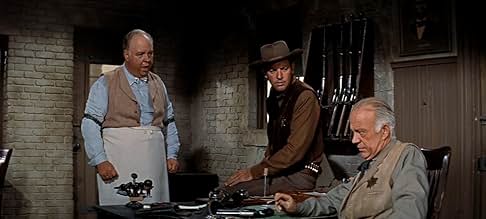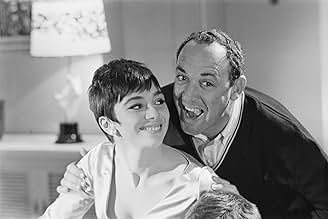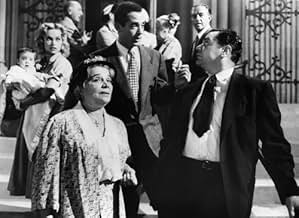Jerry Paris(1925-1986)
- Director
- Actor
- Producer
Glimpsed here and there throughout the 1950s, usually in amiable supporting roles on film, it was as in television that Jerry Paris found his true calling. In front of the camera, however, most fans will remember him as Jerry Helper, the next-door neighbor of Rob and Laura Petrie (Dick Van Dyke and Mary Tyler Moore) on The Dick Van Dyke Show (1961).
He was born William Gerald Paris on July 25, 1925, in San Francisco, California. His father was a Russian immigrant; his mother, the former Esther Mohr, remarried when Jerry was a small child. Jerry's new stepfather, Milton Grossman, eventually adopted the boy and Jerry thereafter used the name William Gerald Grossman while growing up. He reverted back to his real name when he became an actor. He graduated from both New York University and UCLA, and studied at the Actor's Studio after serving in the Navy during WWII. Starting off onstage in such plays as "The Front Page". He appeared dramatically on Broadway twice, making his debut in "Medea" (1947) in the bit part as a soldier, and later appearing in a 1952 revival of "Anna Christie", which starred Celeste Holm.
He turned to films in 1949 with unbilled bits but slowly progressed to a higher acting tier in such durable films as Outrage (1950), The Wild One (1953), The Caine Mutiny (1954), Marty (1955), The Naked and the Dead (1958) and The Great Impostor (1960). Hyperactive in nature, the tall, dark-haired actor was often cast as the genial or helpful pal of the star. He never found that one film role that might have moved him beyond the secondary character ranks. TV, however, would become a more accepting medium. After appearing as a regular in the series The Untouchables (1959) in 1959, Jerry found himself in classic company on The Dick Van Dyke Show (1961) in 1961 as next-door-neighbor Jerry Helper, and (of course) pal to Dick Van Dyke and Mary Tyler Moore.
Loose and fun-loving, Jerry loved to keep the laughs going on- and off-stage and continued to do so -- behind the camera. It was comic actor and "Dick Van Dyke Show" producer Carl Reiner who gave Jerry his first chance to direct on one of the show's episodes. The actor took to it like a duck to water. By the mid-60s, Jerry was a regular director on the show and won an Emmy for his efforts during the 1963-1964 season. Highly encouraged (he also won a Directors Guild Award down the road), he decided to abandon acting and concentrate solely on behind-the-camera work. Working on such movies as Viva Max (1969) and Star Spangled Girl (1971), he eventually returned to familiar territory (TV sitcoms) and found his niche helming several popular shows including Happy Days (1974) (twice Emmy-nominated) and The Odd Couple (1970).
Now and then, Jerry would return to movie-making and helmed his last feature in 1986, Police Academy 3: Back in Training (1986), the year of his death. Diagnosed with brain cancer, he died of complications following surgery. He was 60 years young. Predeceased by his wife, Ruth (Benjamin) Paris, who died in 1980, the couple had three children.
He was born William Gerald Paris on July 25, 1925, in San Francisco, California. His father was a Russian immigrant; his mother, the former Esther Mohr, remarried when Jerry was a small child. Jerry's new stepfather, Milton Grossman, eventually adopted the boy and Jerry thereafter used the name William Gerald Grossman while growing up. He reverted back to his real name when he became an actor. He graduated from both New York University and UCLA, and studied at the Actor's Studio after serving in the Navy during WWII. Starting off onstage in such plays as "The Front Page". He appeared dramatically on Broadway twice, making his debut in "Medea" (1947) in the bit part as a soldier, and later appearing in a 1952 revival of "Anna Christie", which starred Celeste Holm.
He turned to films in 1949 with unbilled bits but slowly progressed to a higher acting tier in such durable films as Outrage (1950), The Wild One (1953), The Caine Mutiny (1954), Marty (1955), The Naked and the Dead (1958) and The Great Impostor (1960). Hyperactive in nature, the tall, dark-haired actor was often cast as the genial or helpful pal of the star. He never found that one film role that might have moved him beyond the secondary character ranks. TV, however, would become a more accepting medium. After appearing as a regular in the series The Untouchables (1959) in 1959, Jerry found himself in classic company on The Dick Van Dyke Show (1961) in 1961 as next-door-neighbor Jerry Helper, and (of course) pal to Dick Van Dyke and Mary Tyler Moore.
Loose and fun-loving, Jerry loved to keep the laughs going on- and off-stage and continued to do so -- behind the camera. It was comic actor and "Dick Van Dyke Show" producer Carl Reiner who gave Jerry his first chance to direct on one of the show's episodes. The actor took to it like a duck to water. By the mid-60s, Jerry was a regular director on the show and won an Emmy for his efforts during the 1963-1964 season. Highly encouraged (he also won a Directors Guild Award down the road), he decided to abandon acting and concentrate solely on behind-the-camera work. Working on such movies as Viva Max (1969) and Star Spangled Girl (1971), he eventually returned to familiar territory (TV sitcoms) and found his niche helming several popular shows including Happy Days (1974) (twice Emmy-nominated) and The Odd Couple (1970).
Now and then, Jerry would return to movie-making and helmed his last feature in 1986, Police Academy 3: Back in Training (1986), the year of his death. Diagnosed with brain cancer, he died of complications following surgery. He was 60 years young. Predeceased by his wife, Ruth (Benjamin) Paris, who died in 1980, the couple had three children.




































